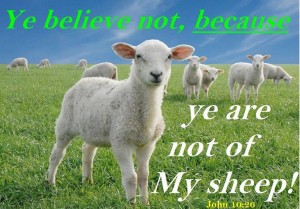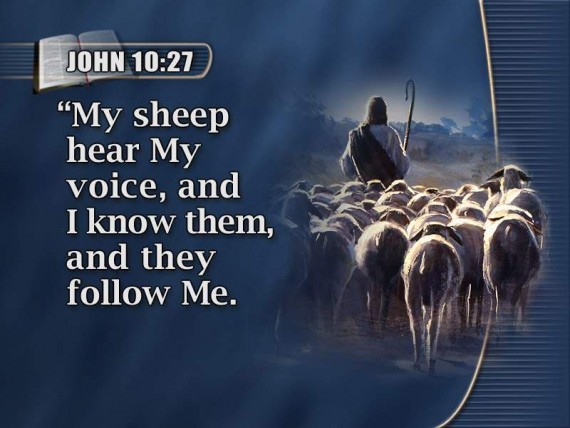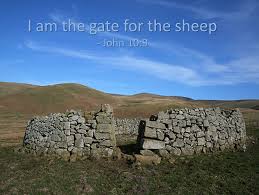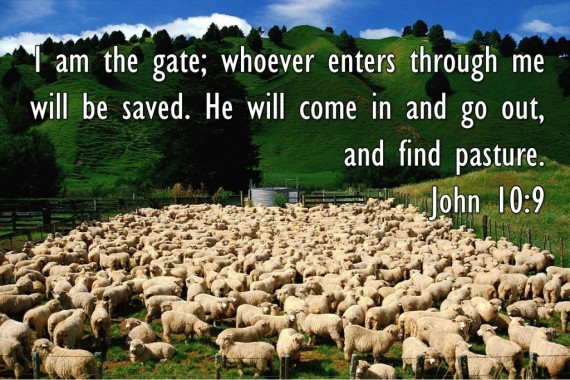 John 10:26 is often cited by Calvinists as a clear statement about Unconditional Election and how people do not become God’s “sheep” because they believe in Jesus; instead, they believe in Jesus because they were already God’s sheep.
John 10:26 is often cited by Calvinists as a clear statement about Unconditional Election and how people do not become God’s “sheep” because they believe in Jesus; instead, they believe in Jesus because they were already God’s sheep.
On this text, John Piper writes, “We believe because we are God’s chosen sheep, not vice versa” (Piper, 5 Points, 54).
This text is also sometimes used to defend the idea that regeneration precedes faith, and that God selects who will be His sheep from eternity past.
A. W. Pink writes that the elect “are ‘sheep’ before they believe, yea, before they are born” (Pink, Sovereignty of God, 338).
And while John 10:26 does pretty clearly state that some people do not believe because they are not God’s sheep, the meaning of the passage depends entirely upon the broader context, and especially what Jesus means by “sheep.”
John 10:26 in Context
John 10:14-16 are three verses in particular which help explain what Jesus is saying in John 10:26.
I am the good shepherd; and I know My sheep, and am known by My own. As the Father knows Me, even so I know the Father; and I lay down My life for the sheep. And other sheep I have which are not of this fold; them also I must bring, and they will hear My voice; and there will be one flock and one shepherd (John 10:14-16).
But you do not believe, because you are not of My sheep, as I said to you (John 10:26).
The imagery of “sheep” is prevalent in John 10, and to understand what Jesus is saying in John 10:26, we must understand what He is saying about sheep, and Himself as the Shepherd.
The truth that was seen in John 6 is important here as well. Jesus has come from God as the promised Messiah, and to help Him accomplish His earthly task, God has given to Jesus all those who were faithful followers of God.
We see this sort of thing happening all over in the Gospel of John. As Jesus engages in His earthly ministry, He frequently explains that those who know God, follow God, listen to God, and hear from God, will naturally and automatically know, follow, listen, and hear Himself as well, since He is from God (John 8:19, 42, 47; 14:7; 15:23; 16:3).

So when Jesus speaks of “sheep” in John 6, He is referring to the Jewish people who came to Him from the Father. This imagery has great support from numerous Old Testament texts (cf. I kings 22:17; Ps 44:11, 22; 74:1; 78:52; 79:13; 95:7; 100:3; 119:176; Isa 53:6; Jer 23:1; 50:6, 17; Ezek 34:6, 11-12).
The Other Sheep of John 10:16
That this is what Jesus means is seen from John 10:16 where Jesus says that He has “other sheep” which are not of this sheepfold. What is He talking about? Since He is talking to Jewish people about those who come to Him from the Father, the “other sheep” are Gentile God-fearers who will also be given to Him by God.
This is exactly what occurs in the book of Acts (cf. Acts 10:1-2, 44-48). The ultimate goal, of course, is to bring both groups of sheep into one flock and under one Shepherd (John 10:16; Eph 2:13-18).
My Sheep Hear My Voice
All of this also explains why Jesus talks about His sheep hearing His voice (John 10:3-4).
The sheep which belong to Jesus have already become accustomed to hearing the voice of God, and so when they hear the voice of Jesus, the recognize His voice as the voice of God, and so they come to Him to follow Him.
These sheep were not unbelievers before they came to Jesus.
No, they were believers in God who followed Him and His ways for their life. They had become accustomed to the pattern and sound of God’s voice, and so when Jesus called them to follow Him, they looked at what He did and what He said, and recognized Him as having come from God.
This also explains why most of the Jewish leaders in John 10 do not come to Jesus: they didn’t recognize Him as the shepherd, because by this point in their history, they had stopped listening to God’s voice. As Alfred Plummer notes, Jesus “and His sheep have most intimate knowledge of one another; therefore these Jews asking who He is prove that they are not His sheep” (Plummer, “The Gospel of John” in The Cambridge Bible, 220).
The Door for the Sheep
 When Jesus talks in John 10:7-10 about being the door for the sheep, He is not necessarily talking about how a person receives eternal life, but is instead talking about how a person finds protection and safety in this life, from those who wants to steal, kill, and destroy.
When Jesus talks in John 10:7-10 about being the door for the sheep, He is not necessarily talking about how a person receives eternal life, but is instead talking about how a person finds protection and safety in this life, from those who wants to steal, kill, and destroy.
When Jesus uses the word “saved” in John 10:9, He is talking about being guided to green pastures and being delivered from the thief who seeks to steal, kill, and destroy. To be “saved” in John 10:9 means to have the abundant life of John 10:10. This is not equivalent to receiving eternal life.
The Unbelieving Sheep of John 10:26
So when all of this is taken into consideration, we see that when Jesus says in John 10:26 to some unbelieving Jews that they do not believe because they are not His sheep, He is not at all saying that they will not believe, or cannot believe.
Nor is He saying that everyone who ever believes in Him was one of His sheep before they believed.
No, Jesus is saying that these specific Jews who are having trouble with His claims, are having this trouble because they were not previously one of God’s sheep.
They do not recognize Jesus for who He is because they never understood who God really was. Despite all their religious claims to the contrary, they never truly followed God or learned to listen to His voice.

If they had, they would have been one of God’s sheep, and God would have given them to Jesus, and they would have recognized His voice when He came to them. But since they did not recognize Him or His voice, this means they were not His sheep, and therefore, were not previously God’s sheep either.
Again, Jesus is not shutting the door in their face and saying there was no hope for them. He was telling them these things in the hopes that they would examine their hearts and minds and consider the idea that maybe, just maybe, Jesus truly was who He said He was, and that He was revealing God to them in the way God truly is.
If they believed in Him, then they would immediately become one of His sheep (though they had not previously been one of God’s), and He would give them eternal life, and would protect them and provide for them just as He does with all His sheep (John 10:27-30).
When Christ came, his sheep, like Simon (Luke 2:25), Anna (Luke 2:36-38), Zacharias and Elizabeth (Luke 1:5-6), the shepherds (Luke 2:8-10), and the disciples (John 1:40-49), knew him (John 10:14), followed him (John 10:27), and received eternal life (John 10:28). We have here the separation of the Jewish sheep from the goats and the drawing of them to the Messiah (Vance, Other Side of Calvinism, 340).
Unconditional Election is not Taught in John 10:26
So there is no statement in John 10:26 about a divine choice in eternity past about who will belong to Jesus and believe in Him. “Jesus gives no hint here that He selected these specific disciples to be His sheep” (Klein, The New Chosen People, 127).
Like the passage in John 6, John 10 explains the transitionary nature of Jesus’ ministry, where those who used to follow God and hear His voice, are now given by God to Jesus so that they now follow Jesus and hear Him.
All those who truly followed God and listened to Him will now follow Jesus and listen to Him, both among Jews and Gentiles. And why does Jesus call His sheep and ask Him to follow them? So that they can be His disciples; so they can serve Him and bless others.
If you want to read more about Calvinism, check out other posts in this blog series: Words of Calvinism and the Word of God.



Trevor, are you saying that the Calvinistic explanation complicates things, or my explanation complicates things?
All I am saying Jeremy is that Jesus simply said that if we are one of His sheep (Jew or Gentile), then we are able to hear His voice and live our lives accordingly.
Yep, Jesus left no room for misunderstanding in what he said in the gospel of John. It’s quite clear!!! Trouble is, Arminians simply can’t accept what the scriptures say and have to go way out in left field to try to explain away what Jesus said.
I don’t know about Arminians or any other ..inians or ..ists but yes indeed in John’s gospel, Jesus clearly and without room for misunderstanding says that because God loved the world, He gave His son so that whosoever believed would not perish but have eternal life.
In the plain grammatical reading of that language , “world” means all the world, and “whosoever believes ” means anybody who chooses to believe.
I accept that, I trust Jesus word. That’s why I believe.
I can’t trust the word of so called theologians who go way out on left field to come up with theories based on Greek philosophy.
Neville brings up a great point. John 3:16 is as clear as it gets, but many people go “left-field” to explain that “all” is only the “elect” that can believe.
The problem with John 10, is that if Jesus is speaking that only the elect can believe (chosen to believe before creation) then Jesus contradicts himself in the same context. Skip down 11 verses and it says
“37 If I am not doing the works of my Father, then do not believe me; 38 but if I do them, even though you do not believe me, believe the works, that you may know and understand that the Father is in me and I am in the Father.”
Jesus is still speaking to the same group that he declared “but you do not believe because you are not among my sheep.” But here, Jesus says that they could believe … interesting, Jesus says they are not his sheep, but yet that they could still believe
This is a very helpful and awesome comment. That made the text clearer to me. Thanks.
Exactly why the ancient Jew of Jesus/Yeshua’s time would have never taken just one verse and used it the way so many are mislead these days. Context is the key to understanding. Calvanism – predestination is a complete misunderstanding by those who could not conceive what it meant that GOD lives outside of time, therefore HE knows the end from the beginning and anywhere along the way. HE did give us free will and we still have it all through this life. He weeps when a human dies without redemption for that soul HE made and paid for redemption is lost.
I dont think Jesus is saying , in John 10:37-38, that they can believe so much as he is saying “im not lying, my works testify about me”.
Jesus’s explanation of the Sheep knowing Him vs those whom arent His sheep was mostly testified to in John 10:20-21 where it says:
“Many of them said, “He has a demon, and is insane; why listen to him?” 21 Others said, “These are not the words of one who is oppressed by a demon. Can a demon open the eyes of the blind?””
Christ’s words split them asunder. The sheep were those whom said “These are not the words of one who is oppressed by a demon. Can a demon open the eyes of the blind?”. They believed the works.
In John 10:37-38, Christ is talking to the ones whom said he had a demon. These were/are the scoffers talked about in 2 Peter 2. These are the goats. When directly confronted with Jesus, God in the flesh, and His works, they denied Him.
Contrast this with other famous Pharisees such as Paul (believed when confronted on the road to Damascus) and Nicodemus. They believed when confronted with Christ.
Now, there are some sheep whom are blinded, these are those Israelites discussed in Romans 9-11, those blinded for the sake of the inclusion of the gentiles, but even they will received life from death because their hardness resulted in mercy to the gentiles, so mercy will be shown to them. And so Christ’s words are true, He lays His life down for His sheep, and NO ONE can steal them away from Him.
Matthew 7:21-23 – remember that not everyone whom confesses with mouth, nor everyone whom does good works in the Lord’s name will be saved. Only those whom the Lord foreknew.
Belief really happens from within the soul. Remember Lot? what good works did he have? Nothing of note, other than his soul within him cried out to Lord in its distress, so the Lord rescued him.
The Lord does indeed judge His sheep though. The works of a sheep will either give them eternal rewards or eternal shame (not hell).
Jeremy: Thanks once again for a clear and thoughtful examination of scripture. Very helpful and refreshing!
I have been thinking about a statement you made in an earlier blog: “We do not choose to believe.” If I recall correctly, you hold that believing comes about when we become so convinced of a truth that belief just naturally follows. Thus, belief is not a conscious decision, it just happens. When we compare belief to faith, do we find them not the same? James 2:19 seems to suggest they are vastly different. So also does the story of the tightrope walker (http://www.crosswalk.com/blogs/dr-ray-pritchard/the-great-blondin-and-true-saving-faith.html).
If we hold that faith is neither a “work” nor a “gift”, then what is it? It makes sense to me that faith is a conscious decision that naturally follows belief. It’s also good to remember that belief and faith are not exclusive to Christianity. Every human being, whether religious or not, has both. It’s just a matter of what they believe and in what or whom they place their faith.
Some might argue that conscious human decisions are “works” thus making faith a work. Perhaps, but if so, such “work” is certainly NOT the type of redemption-seeking, self-righteous, boastful work that James chapter 2 is describing.
So, these are my thoughts, but I would relish your thinking on the dynamics of belief and faith. If you have already written on this subject, please provide the reference. Thanks much!
Bluetarp,
You ask good questions. I am not sure I have a great definition for faith …. I think it maybe it something along the lines of “seeing things that are not as if they were,” but this starts to sound like wishful thinking or hallucinations, and that is not faith.
Maybe imagination would be a good synonym?
My definition of faith is in progress.
As for the dynamics of faith and belief, this is something that only occurs in English. In Greek and Hebrew, the words are identical, so there is likely no difference between the two.
Thanks Jeremy. My thinking on all this is still in progress too, so I appreciate your help. I did not know that the words faith and belief are identical in Greek and Hebrew so I learned something there. However, that brings up another question: If it’s true, as you suggested in an earlier blog, that “we do not choose to believe”, then wouldn’t it be equally true that “we do not choose to have faith”? And that would mean that faith is a “gift” of some kind, which we have already convincingly disproved. So we have a disconnect somewhere? Based on James 2:19, I still think there has to be a difference between faith and belief, however subtle it might be. We all know lots of people who “believe” in God but stop short of fully placing their faith in Him and the work of His Son. They do not possess “saving faith”. Or could belief and faith be the “same thing” in the sense of being progressive along a linear spectrum, perhaps like color subtly progresses from green to blue to purple to red? That’s probably a poor illustration but I’m just trying to make sense of it. Thanks again.
I think the first responders comment is apropos–complicated. You state: “No, Jesus is saying that these specific Jews who are having trouble with His claims, are having this trouble because they were not previously one of God’s sheep.”
If you take out the word “previoiusly,” then you have the simpler, most correct statement, that more closely follows the text.
Trevor, I agree with what you are saying. But then how do you explain Jesus’ statement in John 10:26 that some Jews do not believe because they are not his sheep?
Is Jesus saying that people cannot even believe in Him for eternal life unless they are first His sheep?
YES!!! That’s exactly what Jesus was saying. His sheep hear him, the others don’t. If they were his sheep they would hear him. But they’re not, so they don’t.
When I was talking about the sheep and the goats in Matthew 25 using John chapter 10 as a reference of who the sheep are in Matthew I was not thinking Calvinistic terms nor just in Israel alone since the passage in John 10 does include the gentiles as the “other sheep.” When we hear and accept the gospel message both from the O. T. and N. T. by faith we all become the sheep “one fold” of God. We are the sheep or the goat there can not be any other definition according to Mathews 25. Jeremy gave an exact interpretation I took the passage out of context rather to explain to another reviewer who asked who are the sheep and the goats of Matthew 25 saved or lost
He desires “all” would hear His voice.
Sadly some do not.
Sheep are people who want to follow Jesus, get to know Him intimately and obey…..
I follow but don’t always obey. I wish I didn’t have addictions but chose to keep on keeping on.
Well, there is a pathway set down by the Lord……hear, know and follow (obey)……what part are you leaving out? We are working toward maturity in Jesus Christ (Eph 4)
Great article! Very enlightening. Thanks.
Great stuff. Your explanation was very clear and understandable. Thank you.
No disagreement that those who hear and follow Jesus are those whose hearts were alive to God prior. But who are we to give credit to for hearts that are inclined to God? He is still at the forefront of those peoples faith and understanding. God gives the growth. This section may not prove election wholesale; but you certainly cannot disprove it. Your whole explanation still fits soundly with the doctrines of grace, rightly understood.
There is no question that election is a Bible doctrine. The question is what does the Bible teach about election?
I know, talk about going to great lengths to try to explain away what The Holy Bible plainly says.
” I have other sheep that are not of this sheep pen. I must bring them also. They too will listen to my voice, and there shall be one flock and one shepherd.”
I don’t think this is referring to gentiles, I think it’s more likely Jesus is referring to people of other faiths in the world (Buddhists, Hindus, etc) who still do what is right in the eyes of God. All Jewish people and Christians are already in the sheep pen, as they follow the same God.
All denominations need to believe The Word Of God regardless what there
doctrine teaches them.The Bible is The Final Answer! Amen!
Pray for me for complete healing in my ovaries and womb and bowels. I believe God is able
What are the qualifications to become the sheep of Jesus, HE said l know my sheep, my sheep knoweth me, they hear my voice, and following me how could these manifest in the life of the people who claimed that they are the sheep of Jesus
thats FRIGHETNING, more i read about this god the more FEAR i have 🙁 i question EVERYTHING WANT the truth, but NEVERcan be 100% “was that God or the devil” goto hell for being decived but dont WANT to :(?